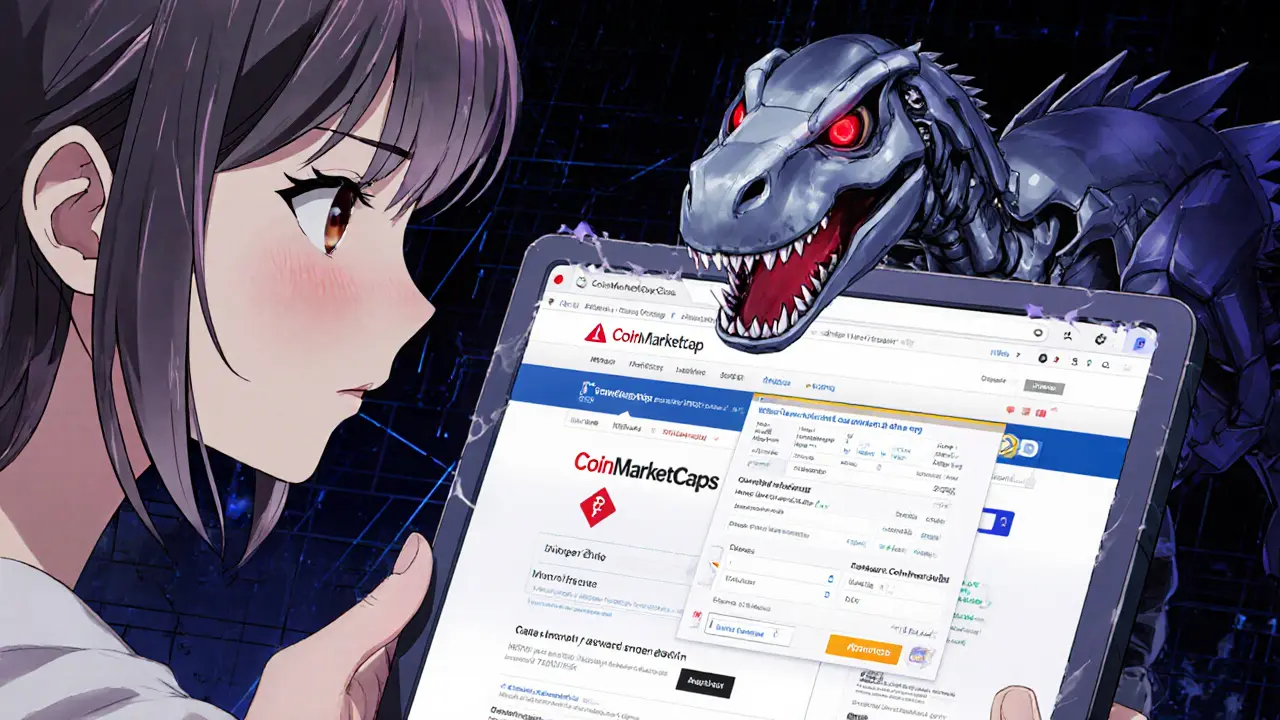Frutti Dino (FDT) Airdrop Scam: What You Need to Know

Frutti Dino (FDT) Airdrop Checker
Enter the details above and click "Check for Scam" to analyze the airdrop claim.
Thousands of crypto fans have watched their wallets emptied after clicking a flashy Frutti Dino airdrop link that promised free tokens. The hype was loud, the promises were big, but the reality was a classic phishing trap. Below we break down the whole story, explain why the alleged "FDT×CoinMarketCap" airdrop never existed, and give you a step‑by‑step checklist to stay safe.
What Is Frutti Dino (FDT)?
Frutti Dino is a blockchain‑based NFT gaming project launched in 2022. It combines play‑to‑earn mechanics with dinosaur‑themed battles where each dino has unique traits and defends a den from wild mutants. The token symbol is FDT, and the contract lives at 0x3a59…f2fF64. According to CoinMarketCap, the token has a reported circulating supply of 73.98million against a total of 993.23million, but the market shows zero trading volume and a $0 price as of October2025.
Why the "FDT×CoinMarketCap" Airdrop Is Suspicious
Official airdrops from CoinMarketCap follow a strict 5‑step verification: a blog announcement on the CoinMarketCap domain, verification through the official wallet app, a transparent on‑chain contract, no request for private keys, and distribution via the integrated wallet. None of these elements appear for the alleged Frutti Dino airdrop.
Searches of CoinMarketCap’s blog, help center, and status page reveal no mention of any partnership with Frutti Dino. Even the popular CryptoRank database, which tracks legitimate token sales, lists only an IEO in October2022 and never records an airdrop.
Security firms such as CertiK and TokenSniffer have flagged the Frutti Dino contract as high‑risk due to mismatched supply metrics and lack of liquidity. The combination of zero volume, an inflated total supply, and no official communication points to a classic scam vector.
Red Flags That Reveal a Fake Airdrop
- Missing official announcement - No blog post, press release, or verified social media tweet from CoinMarketCap.
- Demand for wallet access - Scam sites ask users to connect their wallet and approve token spending, a known phishing technique.
- Unrealistic rewards - Promises of “free 10,000FDT” to anyone who signs up, which would dilute the already scarce token supply.
- Fake domain names - URLs that look like coinmarketcap.com but contain subtle misspellings (e.g., coinmarketcap.io).
- Zero on‑chain activity - The contract shows no airdrop distribution transactions when checked on Etherscan.

How Scammers Pull Off the Frutti Dino Airdrop Trick
Scammers clone CoinMarketCap’s visual style, host a landing page that claims “FDT holders eligible for a special CMC airdrop,” and embed a malicious Web3 widget. When a user clicks “Claim,” the widget requests permission to spend any token in the wallet. Once granted, the attacker drains ETH or other assets to cover gas fees, leaving the victim with an empty address.
According to SlowMist, this method accounted for over 1,200 phishing incidents in August2025 alone. The FTC’s warning letter (FTC‑2025‑1894) explicitly mentions “gaming token airdrop scams” that mimic exchange or data‑provider partnerships.
Legitimate Airdrop Examples for Comparison
| Aspect | Legitimate (e.g., Arbitrum $ARBI) | Fake (Frutti Dino claim) |
|---|---|---|
| Official Announcement | CoinMarketCap blog, verified Twitter | No official source |
| On‑chain Contract | Verified contract address listed publicly | None or hidden |
| Eligibility Rules | Clear snapshot date, wallet activity | Vague “any holder” claim |
| Wallet Access | Never asks for private key or approval | Requests spend approval |
| Trading Volume | Active markets, price data | Zero volume, $0 price |
Step‑by‑Step Verification Checklist
- Visit the official CoinMarketCap site and search for the token. Confirm the page shows a regular listing, not a “preview” placeholder.
- Check the project’s own website and social channels for a link to the airdrop announcement. Look for verified checkmarks on Twitter or Discord.
- Open Etherscan, paste the contract address
0x3a59…f2fF64, and inspect the “Token Transfers” tab for any airdrop‑related transactions. - Use a token‑approval checker (e.g., Immunefi) to see if the site is requesting unlimited spend approvals.
- Never share seed phrases or private keys. Legitimate airdrops never ask for them.
- If you’re still unsure, post the link in a reputable community (e.g., r/CryptoScams) and ask for a second opinion before interacting.

What To Do If You’ve Already Connected Your Wallet
First, revoke any newly granted approvals on Etherscan’s “Token Approvals” page. Then, transfer any remaining ETH to a fresh wallet that has never been used. Finally, report the phishing site to the FTC, CoinMarketCap’s abuse email, and to Binance if you hold assets on their platform - they have an “Airdrop Verification Protocol” that blocks known scam domains.
Broader Context: Gaming Token Scams in 2025
Chainalysis’ 2025 Crypto Crime Report shows gaming‑token airdrop scams make up 34% of all DeFi fraud, with average losses of $1,200 per victim. The ‘CMC partnership’ vector grew 217% year‑over‑year, driven by low‑liquidity tokens like Frutti Dino. Regulatory pressure is mounting: the SEC’s recent case (25‑cv‑8932) targets projects that falsely claim exchange partnerships, and the Ethereum Foundation’s upcoming EIP‑7702 will require contract‑level verification for any airdrop distribution.
Key Takeaways
- The promised Frutti Dino×CoinMarketCap airdrop has no official backing; it’s a phishing scam.
- Zero trading volume, mismatched supply figures, and lack of on‑chain activity are strong red flags.
- Always verify through official channels, check contract activity, and never approve unlimited token spending.
- If you’ve interacted with a suspicious site, revoke approvals, move funds to a new wallet, and report the incident.
- Stay updated on regulatory and technical safeguards like EIP‑7702 that aim to curb fake airdrops.
Frequently Asked Questions
Is there any legitimate Frutti Dino airdrop?
No. Neither CoinMarketCap nor the Frutti Dino team have announced an airdrop. All current claims are unofficial and likely scams.
How can I tell if an airdrop site is fake?
Look for an official blog post on the platform’s domain, verify the contract address on Etherscan, and ensure the site never asks for private keys or wallet approvals. Any deviation is a red flag.
What should I do after I’ve approved a malicious contract?
Immediately revoke the approval on Etherscan, move any remaining assets to a fresh wallet, and file a report with the FTC and the platform that was impersonated.
Are there any trustworthy airdrop trackers?
Yes. Websites like CryptoRank and the official CoinMarketCap “Airdrop” page list only verified drops with clear eligibility rules.
Will upcoming Ethereum upgrades stop these scams?
EIP‑7702 will require airdrop contracts to be verified on‑chain, which should cut down the number of fake drops dramatically, though scammers may still try other phishing methods.



Roxanne Maxwell
October 10, 2025 AT 15:12Ugh I just lost $800 to this exact scam last week. I thought it was real because the site looked so legit. I'm so mad at myself for not checking Etherscan first. If you're reading this and thinking about clicking anything that says 'claim free FDT' - just close it. Your wallet will thank you.
John Murphy
October 10, 2025 AT 18:52That checklist is actually really useful
Zach Crandall
October 10, 2025 AT 23:02It is profoundly concerning that the average crypto user lacks the basic literacy to distinguish between a legitimate token listing and a phishing page. This is not a failure of security infrastructure - it is a systemic collapse of digital responsibility. The fact that people still connect wallets to unverified domains speaks to a cultural decay in Web3.
Andrew Morgan
October 11, 2025 AT 18:18Bro I saw this same scam pop up on Discord last week. Someone sent a link saying 'CMC is giving away 5000 FDT to everyone who joins their server' - it even had fake verified badges. I screenshot it and posted it in r/CryptoScams. Someone else said they lost 2 ETH. This stuff is everywhere now
Michael Folorunsho
October 12, 2025 AT 05:46Why are we even talking about this? This isn't a 'scam' - it's a natural selection event. If you're dumb enough to click a 'free token' link, you deserve to lose everything. The market weeds out the weak. Stop crying and get better. Or better yet - don't touch crypto at all.
Ayanda Ndoni
October 12, 2025 AT 20:18same
Elliott Algarin
October 13, 2025 AT 05:58It's funny how we treat crypto like it's some wild west frontier when really it's just a mirror of human behavior - greed, hope, laziness. The scam isn't in the code. It's in the belief that something free is always real. Maybe the real airdrop is learning to pause before you click
Akinyemi Akindele Winner
October 14, 2025 AT 03:04Yo this FDT thing is just the latest flavor of the same old dumpster fire. They slap a dino on it, call it 'play-to-earn', and suddenly people think it's Web3 magic. Nah fam - it's just a clown car full of crypto zombies with a fake CoinMarketCap logo. I call it 'Dino-Dump' - because that's where your money ends up
MANGESH NEEL
October 14, 2025 AT 09:54Let me break this down for the 12-year-olds in the thread - if your 'token' has zero volume and a $0 price but a 993 million supply, you're not investing - you're funding a Ponzi that's already collapsed. The fact that people still chase these ghosts proves we're not in a bull market - we're in a collective psychosis. And if you think EIP-7702 will fix this? You're even more delusional than the scammers
Sean Huang
October 15, 2025 AT 05:16What if CoinMarketCap is in on it? Think about it - they've been bought out by the same cabal that controls the Fed. The 'scam' is just a distraction. They want you to panic over fake airdrops so you don't notice they're quietly draining liquidity from real DeFi projects. EIP-7702? It's a trap. They're building the surveillance layer for the next phase of crypto control. Don't be fooled. The real scam is trust in institutions
Ali Korkor
October 15, 2025 AT 08:16Hey if you're new to crypto and you're reading this - you're doing great just by looking this up. Don't beat yourself up. Just revoke those approvals, move your funds, and next time - double check everything. We all mess up. The key is to learn and keep going
madhu belavadi
October 15, 2025 AT 13:37i lost 3 eth to this
Dick Lane
October 16, 2025 AT 08:06That checklist saved me last month. I almost clicked a 'Binance x Solana' airdrop that looked exactly like this. I checked Etherscan and saw zero transfers. Just walked away. Simple stuff but so many people skip it
Norman Woo
October 16, 2025 AT 13:47wait so coinmarketcap is fake too? i thought they were legit. i mean i always saw their logo everywhere but now im not sure anymore. like what if they're just part of the whole system? like the whole thing is a simulation and we're all just nodes
Serena Dean
October 17, 2025 AT 05:07Big shoutout to the person who made this guide - this is exactly what the crypto space needs right now. Clear, no-nonsense, and actionable. I'm sharing this with my entire Discord group. If you're reading this and you're still unsure - DM me. I'll walk you through checking your approvals. No shame in asking. We're all learning
James Young
October 17, 2025 AT 18:21You people are wasting time with checklists. The real answer is simple: never interact with any airdrop unless it's from a top 5 exchange and you've personally verified it with their support team. Anything else is gambling. And if you lose? That's what happens when you play with fire. Stop pretending this is about education - it's about discipline. And most of you don't have any